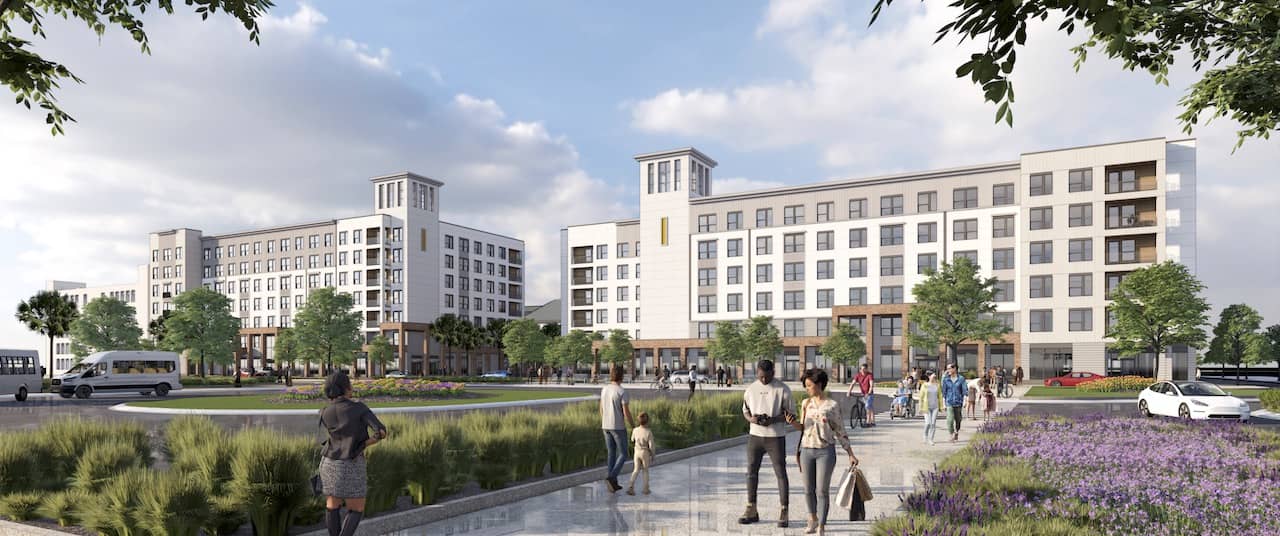Universal Parks & Resorts and its development partner today revealed the name and initial development plan for their affordable housing project in Orlando.
Universal in 2020 announced that it would donate 20 acres of its property near International Drive for the project, following opposition from local housing advocates to an expansion of Kirkman Road that Universal requested for its new Epic Universe theme park.
Last year, Universal selected Wendover Housing Partners as the developer for the project, which would create 1,000 units of affordable/mixed-income housing.
Today, Universal and Wendover announced that the development would be called Catchlight Crossings.

Community amenities announced today in initial development plan will include an on-site tuition-free preschool, on-site medical offices, a neighborhood food pantry, fitness center, and a transportation center for buses, ridesharing and employer shuttles.
"Through this partnership with Universal, we hope to serve as a model for how private employers, local governments and developers can work together to address socioeconomic issues in the communities where we live and work," Wendover Housing Partners CEO Jonathan L. Wolf said. "What Wendover and Universal are creating here is truly unique and will leave a lasting, positive impact on the community for generations to come."
* * *
We wanted you to read this article before we make our newsletter pitch, unlike so many other websites. If you appreciate that - and our approach to covering theme park, travel, and entertainment news - please sign up for our free, three-times-a-week email newsletter. Thank you.
Question - by *Food Pantry* do you know if they are referring to place for those with food insecurity to go for free or greatly reduced staples, or is that just a term to mean a smallish grocery store?
No idea. Am trying to chase more detail.
I am always skeptical when I read about "affordable housing". These projects always reek of corruption and backchannel deals designed to enrich developers.
it’s probably safe to assume that all for-profit housing benefits developers. what makes me skeptical about affordable housing is a) how affordable it actually is and b) how much of this kind of thing the state of florida offloads on to the private sector (aka, the for-profit sector)
that doesn’t usually work out that great for poor people. (not that, to whit, we have a robust counter example in this country to point to)
I'm not sure how it works in Florida, but in the Mid-Atlantic, and much of the NE, "affordable housing" is usually built by "for profit" developers and rented/leased to residents through various voucher programs (i.e Section 8) or sold through strictly governed application programs. However, those programs don't always ensure that units are filled by "worthy" individuals, because developers can still require occupants meet certain financial standards and some application programs have such broad standards that a household making a quarter of a million dollars a year can compete against those making minimum wage (first responder and teacher buyer programs that don't restrict spouse/partner earnings).
Also, the big issue for me is that developers always dangle the carrot of "affordable housing" to policy makers/zoning boards in exchange for some other benefit that is financially lucrative. Typically what is done is that a developer agrees to create say 100 "affordable" units on a 500-acre development at a loss (or break even) that are focused in one or 2 condo buildings covering @10 acres, and then sell hundreds of million-dollar estates, single family homes, and townhouses across the other 490 acres at a massive profit. In the end, the developers argue that bringing residents from various financial backgrounds creates a more diverse neighborhood, but the way these developments are constructed, you could never tell that the estates, single family homes, townhouses, and condos are part of the same development.
Ultimately, I don't know what the solution is, but I am strongly opposed to giving developers concessions to build "affordable housing", and that providing homes across the entirety of the financial spectrum should be an ethical obligation sought from all developers. Yes, the margins on units at the lower end of the spectrum are not going to be as high, and there is always risk in selling/renting to those with more modest means, but I don't understand why developers can't see the advantage of selling in bulk, especially if they can immediately sell or subcontract the liability and risk of managing these properties.
This kinda goes back to the trends in society and extending into the world of theme parks. Businesses are more often steering away from lower-end consumers because margins are tighter despite steady, proven revenue. They would rather chase the big spenders who bring much higher margins though tend to be more finicky.
You can thank the Orlando Sentinel for this affordable housing project as they were relentlessly hounding Universal and Orange County over the Kirkman Road extension funding for Epic Universe, which was split half between the two. They created so much backlash that all of a sudden Universal announced they were dedicated some of their land affordable housing right before the county commissioners voted on funding the road.
This article has been archived and is no longer accepting comments.
florida politics are absolutely bizarre